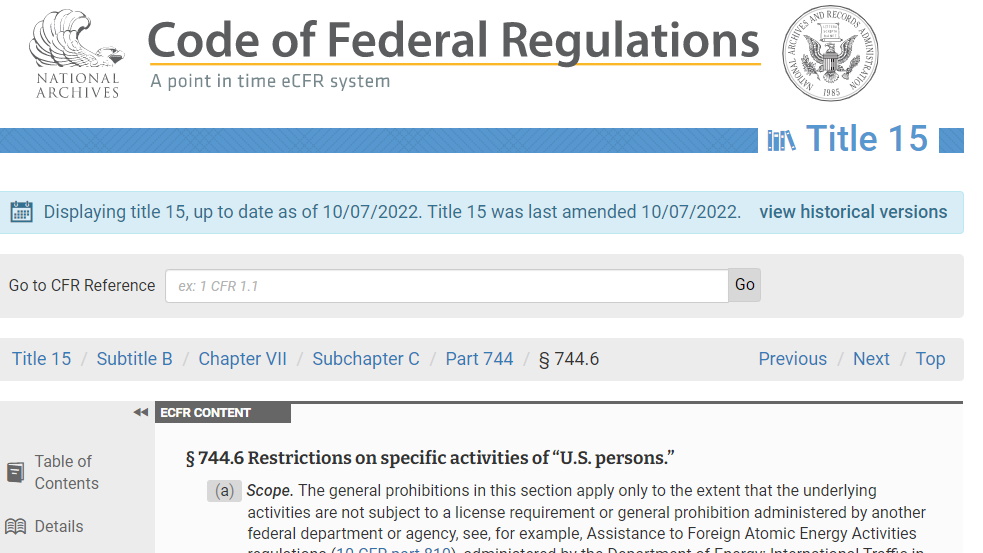Restrictions on specific activities of “U.S. persons by Federal Laws

§ 744.6 Restrictions on specific activities of “U.S. persons.”
(a) Scope. The general prohibitions in this section apply only to the extent that the underlying activities are not subject to a license requirement or general prohibition administered by another federal department or agency, see, for example, Assistance to Foreign Atomic Energy Activities regulations (10 CFR part 810), administered by the Department of Energy; International Traffic in Arms Regulations (ITAR) (22 CFR parts 120 through 130), administered by the Department of State; and certain sanctions regulations (to include, but not limited to, 31 CFR parts 500 through 599), administered by the Department of the Treasury. Accordingly, “U.S. persons” are required to seek a license from BIS only for the activities described in this section that are not subject to a license requirement or general prohibition administered by the Department of Energy, Department of State, Department of the Treasury, or other federal department or agency. The issuance of a license by BIS, or any other federal department or agency, does not authorize “U.S. persons” to engage in any activity that is otherwise prohibited by law, including criminal statutes.
(b) General prohibitions. No “U.S. person” may, without a license from BIS, ‘support’:
(1) The design, “development,” “production,” operation, installation (including on-site installation), maintenance (checking), repair, overhaul, or refurbishing of nuclear explosive devices in or by any country not listed in supplement no. 3 to this part;
(2) The design, “development,” “production,” operation, installation (including on-site installation), maintenance (checking), repair, overhaul, or refurbishing of “missiles” in or by a country listed in Country Groups D:4 or E:2;
(3) The design, “development,” “production,” operation, installation (including on-site installation), maintenance (checking), repair, overhaul, or refurbishing of chemical or biological weapons in or by any country or destination worldwide;
(4) The design, “development,” “production,” operation, installation (including on-site installation), maintenance (checking), repair, overhaul, refurbishing, shipment, or transfer (in-country) of a whole plant to make chemical weapons precursors identified in ECCN 1C350, in or by countries other than those listed in Country Group A:3 (Australia Group); or
(5) A ‘military-intelligence end use’ or a ‘military-intelligence end user,’ as defined in § 744.22(f), in Belarus, Burma, Cambodia, the People’s Republic of China, Russia, or Venezuela; or a country listed in Country Groups E:1 or E:2 (see supplement no. 1 to part 740 of the EAR).
(6) ‘Support’ means:
(i) Shipping or transmitting from one foreign country to another foreign country any item not subject to the EAR you know will be used in or by any of the end uses or end users described in paragraphs (b)(1) through (5) of this section, including the sending or taking of such item to or from foreign countries in any manner;
(ii) Transferring (in-country) any item not subject to the EAR you know will be used in or by any of the end uses or end users described in paragraphs (b)(1) through (5) of this section;
(iii) Facilitating such shipment, transmission, or transfer (in-country); or
(iv) Performing any contract, service, or employment you know may assist or benefit any of the end uses or end users described in paragraphs (b)(1) through (5) of this section, including, but not limited to: Ordering, buying, removing, concealing, storing, using, selling, loaning, disposing, servicing, financing, transporting, freight forwarding, or conducting negotiations in furtherance of.
(c) Additional prohibitions on “U.S. persons” informed by BIS. BIS may inform “U.S. persons,” either individually by specific notice, through amendment to the EAR published in the Federal Register, or through a separate notice published in the Federal Register, that a license is required because an activity could involve the types of ‘support’ (as defined in paragraph (b)(6) of this section) to the end uses or end users described in paragraphs (b)(1) through (5) of this section. Specific notice is to be given only by, or at the direction of, the Deputy Assistant Secretary for Export Administration. When such notice is provided orally, it will be followed by a written notice within two working days signed by the Deputy Assistant Secretary for Export Administration. However, the absence of any such notification does not excuse the “U.S. person” from compliance with the license requirements of paragraph (b) of this section.
(d) Exceptions.
(1) No License Exceptions apply to the prohibitions described in paragraphs (b)(1) through (4) of this section.
(2) Notwithstanding the prohibitions in paragraph (b)(5) of this section, “U.S. persons” who are employees of a department or agency of the U.S. Government may ‘support’ a ‘military-intelligence end use’ or a ‘military-intelligence end user,’ as described in paragraph (b)(5), if the ‘support’ is provided in the performance of official duties in furtherance of a U.S. Government program that is authorized by law and subject to control by the President by other means. This paragraph does not authorize a department or agency of the U.S. Government to provide ‘support’ that is otherwise prohibited by other administrative provisions or by statute. ‘Contractor support personnel’ of a department or agency of the U.S. Government are eligible for this authorization when in the performance of their duties pursuant to the applicable contract or other official duties. ‘Contractor support personnel’ for the purposes of this paragraph (d)(2) has the same meaning given to that term in § 740.11(b)(2)(ii) of the EAR. This authorization is not available when a department or agency of the U.S. Government acts as an agent on behalf of a non-U.S. Government person.
(e) License review standards.
(1) Applications for a “U.S. person” to ‘support’ (as defined in paragraph (b)(6) of this section) any of the end uses or end users described in paragraphs (b)(1) through (4) of this section will be denied if such support would make a material contribution to the end uses and end users described in paragraphs (b)(1) through (4) of this section.
(2) Applications for a “U.S. person” to ‘support’ (as defined in paragraph (b)(6) of this section) a ‘military-intelligence end use’ or a ‘military-intelligence end user’ as described in paragraph (b)(5) of this section will be reviewed with a presumption of denial.
[86 FR 4871, Jan. 15, 2021, as amended at 86 FR 18436, Apr. 9, 2021; 86 FR 70018, Dec. 9, 2021; 87 FR 13059, Mar. 8, 2022]

![]()







